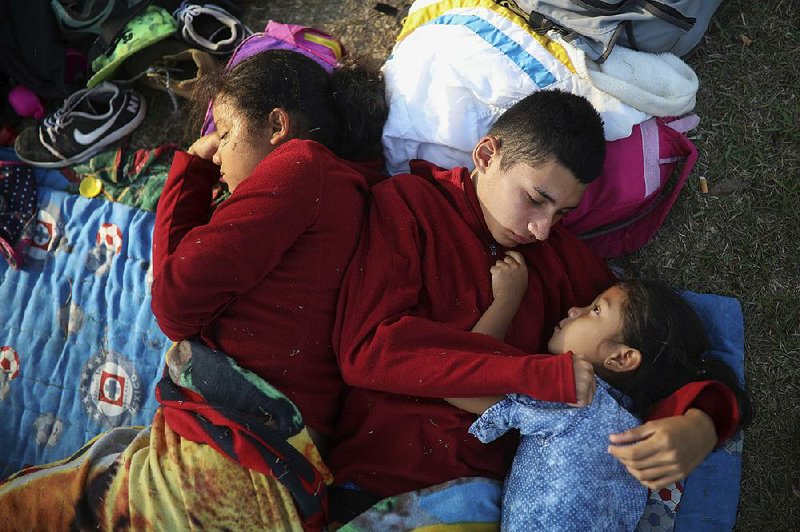MATIAS ROMERO, Mexico -- The Mexican government began handing out transit or humanitarian visas to people in a caravan of Central American migrants and said the procession of 1,000 or so migrants that drew criticism from President Donald Trump had begun to disperse.
Some migrants who awoke at the camp Wednesday said they would try their luck at requesting asylum in the United States, others in Mexico.
Elmer Zelaya Gomez, 38, from eastern El Salvador, has been sleeping with his wife and three children aged 7, 13 and 14 on the soccer field under blankets as they wait for temporary transit visas from Mexico to continue to the U.S. border. He said he hopes to request asylum and join relatives in New York.
"We didn't leave our countries just because we wanted to," Zelaya Gomez said. "It's for the safety of our children."
Like many, he had joined the caravan -- which was never expected to be so big and never planned to go all the way to the border -- because there was safety in numbers.
Now, the family faces the prospect of traveling solo, and the caravan is scheduled to make its final stops this week at a migrants' rights symposium in the central city of Puebla, and end in Mexico City.
[U.S. immigration: Data visualization of selected immigration statistics, U.S. border map]
"It seems a little complicated, with the robberies, kidnappings, and all of that," Zelaya Gomez said. "It's a little scary, to travel without the caravan."
Organizer Irineo Mujica said, "We will try to find a better way of doing our caravans" in coming years. "We didn't anticipate, or want, a caravan of this size."
The caravan is an annual, symbolic event held around Easter each year to raise awareness about the plight of migrants and has never left southern Mexico, though some participants then continue north on their own.
Trump's criticism of the caravan and Mexico's supposed permissiveness in allowing it to proceed have confused and befuddled Mexican families, who deny they are a threat. Many say they never intended on going all the way to the United States after the end of the "Stations of the Cross" caravan. Some are seeking asylum in Mexico.
Even coordinators of the caravan seemed to misunderstand the debate in the U.S. when Trump endorsed a "nuclear option" for pushing funding for his border wall through Congress. They told worried families Tuesday that the U.S. president had floated the idea of using a nuclear weapon against the caravan of mostly women and children who have fled violence in Central America.
The Mexican government said in a statement late Tuesday that its immigration policy "is not subject to pressure," but it noted that the caravan "began to disperse by decision of the participants."
It said 465 migrants had asked for transit visas and 230 had gotten them, and another 168 were likely to get some sort of visa to stay in Mexico.
Sitting on a thin foam pad and trying to corral her sons, 2-year-old Jonathan and 6-year-old Omar, Gabriela Hernandez wondered aloud at what Trump must think of them.
"I see it as something really sad, because I don't understand how a child this age can make things difficult for him," said Hernandez, a 27-year-old who is two months pregnant.
She said she would like to get into the U.S., where she has a cousin in Houston. Crime in Honduras was so bad that she decided to embark on the difficult journey across several international borders with two young, asthmatic sons, the younger of whom is now sick and on antibiotics.
Late Tuesday, the first migrants began receiving documents from Mexican immigration authorities. Some give them 20 days to transit the country on their way to the U.S. border with the stated goal of applying for asylum. Others got papers in a first step toward a humanitarian Mexican residency visa for especially vulnerable people or a start to the application process for asylum in Mexico.
RELATED ARTICLES
http://www.arkansas…">Trump calls Guard to face border 'crisis'http://www.arkansas…">Guard assigned to border before
A Section on 04/05/2018

